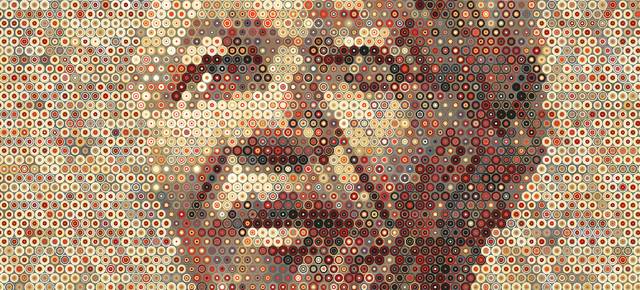
Seven finalists have been shortlisted to win up to $80 000 for their socially impactful ventures in Africa. The finalists run transformative projects in areas ranging from educational technology to sustainable fashion and public health. They come from Nigeria, Kenya, South Africa, Zimbabwe, Malawi and Canada. The winners will be announced live on the 23rd of October.
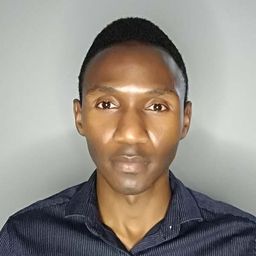
Rural, remote and low-income patients are often excluded from clinical trials in Africa. Currently, only formally recognised research sites can conduct vaccine trials, which limits participation.
Sammy Sambu is working on the problem of malaria in Kenya. He founded Bartanel Discovery which proposes decentralised, mobile-enabled clinical trials situated in high-malaria regions, that can demonstrate that the vaccine works. Using mobile technology, the project seeks to secure the continuity of service and consistency in health-seeking behaviour. This will lead to more people enrolling and completing the malaria vaccine program. Malaria takes a huge toll on people and economies in some African countries. If enough people areimmunised against malaria, there will be many positive benefits: if less children die of malaria, families are less likely to hedge against infant mortality by having more children.This supports family planning. Preventing malaria will also improve early development and educational outcomes among children, by reducing the loss of school time due to sickness.
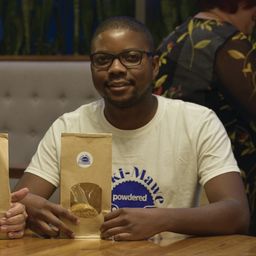
Keki-Mawe was established in 2016 by James Tayali as a social venture to reduce malnutrition, hunger and poverty in Malawi. They empower communities with agriculture training and food products that can alleviate hunger and malnutrition.
Hunger and Malnutrition are some of the critical public health problems that people in Malawi are facing. According to the United Nations report of 2019, approximately 1.2 million children under the age of 5 suffer from chronic malnutrition and 2.9 million people face hunger every year in Malawi. It also estimated that about 30% of pregnant women in Malawi suffer from some form of anaemia every year, most of which is related to deficiencies in nutrients such as iron and folate. Keki-Mawe aims to help the government to meet the United Nations Sustainable Development Goal Number. 2 of reducing hunger and malnutrition, through Agriculture and Food Security interventions in Malawi.
Keki-Mawe uses innovation and food science to produce simple but highly nutritious food, such as iron fortified powders, biscuits and instant porridge made from locally sourced ingredients. The food products are rich in essential nutrients such as iron, folate, calcium, proteins and vitamins, which are essential for human growth and can reduce the risk of developing health problems.
They also empower rural farmers with innovative agricultural trainings so that they can grow various nutritious crops, while withstanding adverse effects of climate change in order to achieve high yields from their farms and attain food security for their household. Trainings cover crop production methods of various crops and are codeveloped by agricultural experts and other experienced farmers in Malawi. Keki-Mawe also procures some of their produce and uses it as raw materials, to manufacture highly nutritious products that can alleviate hunger and malnutrition across the nation. This also empowers farmers with an opportunity to make extra income from their produce and provides them with a means of reducing poverty.
So far, through training workshops and other digital tools, Keki-Mawe has trained over 70,000 farmers in the central and northern region of Malawi and have helped them to achieve over 70% of more yield as compared to non-adopters of our agricultural methods. They have also produced and tested over 5000 biscuit units and instant porridge powders, that offer 60% daily value of iron and other essential nutrients. Keki-Mawe products have been tested and approved by various stakeholders, e.g., women associations, retailers, health organizations, and government, and we have received overwhelming positive feedback for their taste, design, price and nutritional impact in solving hunger and malnutrition

Headed by Kenechukwu Ikebuaku, Mozisha is an innovative educational development platform with a difference. Unlike many educational platforms that are theory based, Mozisha focuses on the practical dimension of learning. Think of Mozisha as a Skills Factory for the African youth. Through their Digital Apprenticeship Platform, they connect learners with businesses in order to develop their skills in line with demands of the labour market.
Mozisha aims to foster the actualization of the Sustainable Development Goal Eight (SDG 8) by helping to equip African youth with requisite skills and matching them up with employment opportunities. At the root of youth unemployment lies both inadequate job creation and the lack of skills or skills mismatch on the part of the job seekers. So, while concerted efforts must be put into enterprise development and adequate job creation, it only solves one part of the equation. Young Africans are also unemployed because they do not have the skills that the market demands — this needs to be addressed too.
Before matching students with businesses, Mozisha equips them with requisite knowledge using its gamified interactive e-learning platform to ensure they add maximum value to the businesses. Graduates of the Mozisha apprenticeship programme are connected with employment opportunities either through the freelancing platform or full-time employment with their partners. The apprentices get personalised support from Mozisha mentors and they also become part of the supportive Mozisha community. On concluding apprenticeship, learners receive certificates co-signed by Mozisha and the partner businesses and institutions. Mozisha offers a wide range of Skills including Digital Marketing, Graphics/Animation, Data Analytics and Coding/Software Development.
Visit www.mozisha.com and join them in building Africa’s No 1 Skills Factory!
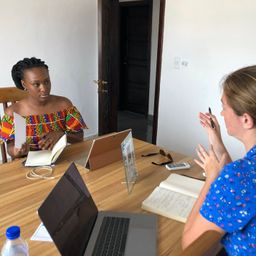
Living in Rwanda as a teenager, Sarah Burns learnt about the profound influence of the private sector on local violence. Years later, her PhD research, analyses the use of impact investment as a tool to generate sustainable and ethical development in post conflict Africa. In her field work she became frustrated with the African impact investing market. All these actors, even those with excellent intentions, said they were unable to find ‘investment-ready businesses.’ During her research, she spent 5 years working with tenacious, innovative, and exceptional West African entrepreneurs that didn’t fit into this very narrow box of requirements set by the funds. She saw first had the “missing middle” financing problem. These small businesses required a significant boost in capital to grow but could not take on the $2+ million investment required by the most active investors.
In searching for alternatives, it became clear that the current impact investing market in Africa is exclusive. If you do not have the networks and a lot of capital you can put at risk, it is extremely difficult to invest. By keeping it exclusive, we are cutting off a vast amount of resources and good intentions of people who just don’t have the tools to reach the right businesses. The current lack of transparency and access is stopping the flow of funds into, not only extremely impactful businesses, but also very promising ones.
This is how the idea for Nia came about, the first equity crowdfunding platform that provides access to individuals and institutions from around the world with opportunities to invest in small African businesses easily and safely. Sarah teamed up with two colleagues from the Oxford MBA, Samuel Darko and Khuthadzo Masindi. They develop fundraising campaigns for high-growth businesses looking for $100,000 to $1,000,000. Each business they work with is positively contributing to the Sustainable Development Goals. They work with businesses that are continuously overlooked by the large funds and we give them the opportunity to really take off. Investors can choose which businesses they would like to support and can do so with as little as £100, making it accessible to a much larger audience. Nia’s primary goal is to make investing in Africa easier, cheaper, fully transparent, and more accessible to help bring in much needed investment and shrink the $140 billion dollar ‘missing middle’ financing gap. They believe that we can all work together to find ‘purpose’ with our finances by fuelling local business growth and prosperity.
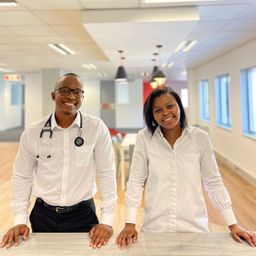
Quro Medical which is co-founded by Vuyane Mhlomi, is digital health tech startu-up based in South Africa, where the healthcare system is overburdened and resources are limited. The healthcare sector’s struggle with bed capacity, limited resources in hospital environments and, over-stretched healthcare workers during the COVID-19 crisis exposed a huge need for this type of patient care, not only overseas but also on the African continent.
Quro’s focus is on providing hospital-level care for patients without them needing to leave home. Quro aspires to build Africa’s biggest virtual hospital which goes far beyond traditional telehealth. The Hospital at Home is powered by integrated, cutting-edge technology, and supported by highly skilled clinical staff, clinical protocols, and best clinical practices. When patients are referred by their doctors to the Hospital at Home solution, Quro gives them monitoring devices which collect health data minute-by-minute. The patient data is analysed constantly in real time via a 24/7 monitoring site. The patient’s doctor also has access to this monitoring platform so that they can easily manage the treatment plan for their patients. By monitoring patients every minute, the slightest change in their health data- such as heart-rate or blood pressure- is picked up. This provides early warning about any possible deterioration, in time to get them the necessary healthcare via emergency medical services.
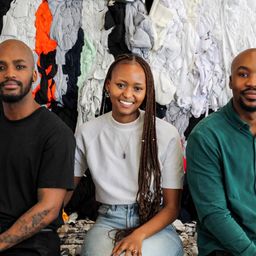
Co-founded by Esethu Cenga, Rewoven is an innovation project and business that seeks to divert textile waste from landfill by creating 100% recycled fabrics from textile waste and plastic waste. Rewoven’s objective is to mitigate some of the adverse impacts of fast-fashion which see many people and communities in developing countries (especially in Asia and Africa) and their environment being exploited in order for retailers to maximize on profits. As such, at the core of Rewoven’s vision is to create a socially and ecologically sustainable way to create clothing; and in a much larger sense — create socially and ecologically sustainable ways of living. For Rewoven, this includes forcing the capitalist model to not only account for profits, but to also account for people at a genuine-level and the planet. By creating 100% recycled fabrics, Rewoven is firstly diverting waste from landfill and their manufacturing/recycling process also uses no water, no toxic dyes or chemicals. This introduces a zero waste and eco-conscious way of producing textiles, one that no longer seeks to exploit the environment for all its resources, but also seeks to preserve those resources and use them responsibly. Rewoven is also vocal about ensuring the workers who help make these fabrics, are treated as people who need to live and be empowered, and are not mere ‘labor cost’ line items on a financial statement. This is particularly important given that majority of the people who work in the clothing industry are women of color in developing countries, between the ages of 18 — 24. Rewoven also seeks to empower consumers to use their political power — their money — to support the brands that align with their values. Overall, Rewoven not only aims to innovate and be a pioneer in textile production, but it also aims to bring a shift in how we produce and consume products for the sustainability of ourselves as a community of people; and the planet we need to survive.
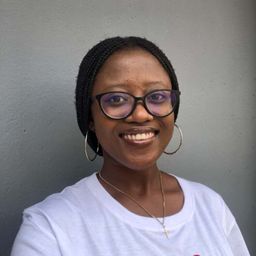
Co-founded by Chido Dizinotyiwei, Vambo Academy is an educational technology (EdTech) platform that uses digital resources to offer language learning, translation and knowledge services. They are working to include technology to enhance the African language learning process.
Africa is the fastest growing and second largest continent in the world yet African knowledge resources are difficult to source. Some are shared in novels or academic papers and most indigenous knowledge rests within rural and minority communities. The fast pace of modern life and business challenge traditional learning methods and risk the extinction of cultures, dialects and languages on the continent.
Vambo Academy is a solution by Africans for Africa. There is a need to enhance the process of communication, language learning and awareness of indigenous knowledge systems. They are committed to building resources that drive inclusion, localise experiences, campaigns and business by making it easier for language to form the basis of the story. They believe that every African language and culture deserves to be preserved and learned.